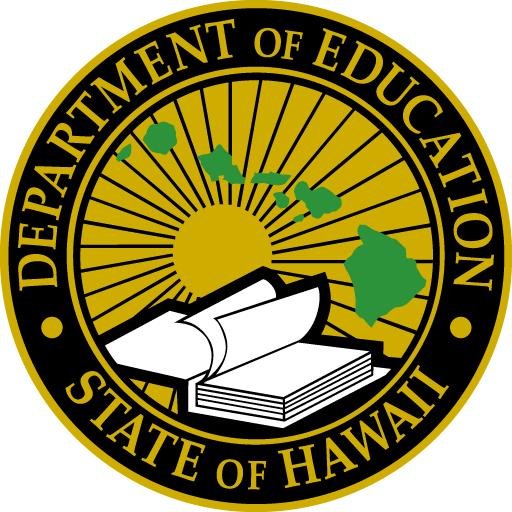E ola pono. E mālama i nā piko.
Live pono. Nurture thriving connections.
While the primary focus of health education is the development of health skills, these skills must be addressed in conjunction with functional information in the context of priority risk topics. Standards-based health education must be age and developmentally appropriate, medically accurate and provide factual information in all priority risk topics:
- Mental and emotional health
- Healthy eating and physical activity
- Personal health and wellness
- 安全(预防意外伤害)
- 预防暴力
- 预防吸烟
- 预防酒精和其他药物的使用
- Sexual health and responsibility
笔记: 健康教育 in prekindergarten is aligned to the 夏威夷早期学习和发展标准 (HELDS).
课程要求
- 健康教育 is required in all elementary grades.
- Middle/intermediate schools must offer courses that allow all students to meet Hawaiʻi՚s health education standards and performance indicators for grades 6-8. One semester (0.5 credits; 60 hours) of health education in each middle/intermediate school grade is strongly recommended but not required.
- In high school, a one semester course (0.5 credits; 60 hours) in health education is required for graduation.
- A variety of health specialized elective courses (e.g., peer education) are available at the secondary school level.
- 有关初中升学和高中毕业的要求,请参阅 董事会政策 105-1 学术计划 (PDF), Board Policy 102-9 Middle Level 教育 Promotion Policy (PDF), 和 董事会政策 102-15 高中毕业要求和毕业典礼 (PDF).
wellness guidelines for 健康教育
Comprehensive health education provides the instructional foundation that prepares students to build healthy relationships and make lifelong healthy decisions. The 健康指南 support quality health education grounded in Hawaiʻi.
The wellness guidelines for health education are organized around 三个关键组件 that address instructional minutes, include nutrition education, and emphasize culturally relevant and ʻāina-based approaches:
- Instructional content of health education classes includes a focus on knowledge and skills that support healthy eating and is aligned with the HIDOE standards for health education.
- 健康教育 is provided to students in elementary grades at least 45 minutes per week and secondary grades at least 200 minutes per week.
- Nutrition education includes culturally relevant activities that are ʻāina-based and hands-on, such as food preparation, taste-testing, farm visits and school gardens.
Sexual 健康教育
Comprehensive sexual health education helps students understand and navigate their development and growth as they progress from childhood through puberty and adolescence. Effective, comprehensive sexual health education provides students with the age-appropriate, medically accurate content and skills to know and be able to communicate for healthy relationships, access resources and support, and make healthy decisions.
Several state laws and policies help prevent teen pregnancy and the spread of sexually transmitted infections through comprehensive sexual health education.
- 国家法律 (Hawaiʻi Revised Statutes (HRS) §321-11.1) establishes requirements for any state-funded sexual health education program.
- Board Policy 103-5 Sexual 健康教育 (PDF) requires the Department to implement comprehensive sexual health education.
- 学校所采用的课程描述应提供给家长/法定监护人,并应在任何教学开始之前发布在学校网站上。
- A student shall be excused from sexual health instruction only upon the prior written request of the student’s parent or legal guardian.
- 如果学生的父母或法定监护人提出书面请求,学生可能不会受到纪律处分、学术处罚或其他制裁。
Parents or legal guardians can also opt-out of having their children participate in instruction related to controversial issues.
父母或法定监护人可以写信给学校管理人员或老师,要求将孩子排除在特定课程或活动之外。如果收到这样的信件,必须为学生提供替代的学习活动。父母或法定监护人有义务在课程或活动开始前通知学校管理人员或老师。
Recommended instructional materials:
- FLASH (PDF)
- Get Real (PDF)
- HealthSmart (PDF)
- Pono Choices (PDF)
- Positive Prevention PLUS (PDF)
- Reducing the Risk with the Supplement (PDF)
- Rights, Respect, Responsibility (PDF)
Learn more about Sexual 健康教育 in the HIDOE (PDF)
Sexual Violence Prevention 教育
Teaching students about sexual violence prevention is essential for nurturing safe and caring schools and communities. It equips students with information and skills that promote healthy relationships and respect for others. It also helps students understand how to seek support if they or someone they know experiences sexual violence.
Prevention-oriented and developmentally-appropriate sexual violence prevention instruction to students addresses:
- bodily autonomy (e.g., body awareness and safety, consent, boundaries),
- recognizing and reporting sexual abuse, and
- accessible resources (e.g., trusted adults, community resources).
Department schools will be responsible for providing a description of the curriculum on their public-facing websites. Before the start of instruction to students, schools will notify parents and legal guardians about the upcoming instruction, how to preview the school’s materials, and the opt-out process.
A student shall be excused from sexual violence prevention instruction only upon the prior written request of the student’s parent or legal guardian. A student may not be subject to disciplinary action, academic penalty, or other sanctions if the student’s parent or legal guardian makes a written request.
Approved instructional materials:
- Elevatus Training Curriculum: Sexuality 教育 for People with Developmental Disabilities, Adapted for People with High Support Learning Needs (PDF)
- Fight Child Abuse (PDF)
- HealthSmart (PDF)
- Mad Hatter Wellness Curricula (PDF)
- NetSmartz (PDF)
- Positive Prevention PLUS, Special Populations (PDF)
- Rights, Respect, Responsibility (PDF)
- Second Step Child Protection Unit (PDF)
- The Sex Abuse Treatment Center’s Sexual Abuse Prevention Curricula (PDF)
Learn more about Sexual Violence Prevention in HIDOE.
general health education 资源
- Why 健康教育 Matters (Google Doc)
- 健康教育 Standards and Topics Overview (Google Doc)
- Learning Design for 健康
- 健康教育 Printables (Google Drive)
- 健康指南
- You Matter! 健康 资源
- Using School Gardens in 健康教育
- Reviewing Instructional Materials for 健康教育 (PDF)
- 2022 Hawaiʻi School 健康 Profiles – Highlights Report (PDF)
美国农业部非歧视声明
根据联邦民权法和美国农业部 (USDA) 民权法规和政策,本机构禁止基于种族、肤色、国籍、性别(包括性别认同和性取向)、残疾、年龄或对先前民权活动的报复或报复而进行歧视。
计划信息可能以英语以外的其他语言提供。需要其他沟通方式(例如盲文、大字印刷品、录音带、美国手语)获取计划信息的残障人士应联系负责管理该计划的州或地方机构或美国农业部的 TARGET 中心,电话 (202) 720-2600(语音和 TTY),或通过联邦中继服务 (800) 877-8339 联系美国农业部。
要提出项目歧视投诉,投诉人应填写表格 AD-3027(美国农业部项目歧视投诉表),该表格可从以下网址在线获取: https://www.usda.gov/sites/default/files/documents/USDA-OASCR%20P-Complaint-Form-0508-0002-508-11-28-17Fax2Mail.pdf,可从任何 USDA 办公室拨打 (866) 632-9992 或写信给 USDA。信中必须包含投诉人的姓名、地址、电话号码以及对涉嫌歧视行为的书面描述,且描述应足够详细,以便向民权事务助理部长 (ASCR) 告知涉嫌侵犯民权的性质和日期。填妥的 AD-3027 表格或信函必须通过以下方式提交给 USDA:
- 邮件:
美国农业部
民权事务助理部长办公室
西南独立大道 1400 号
华盛顿特区 20250-9410;或 - 传真:
(833)256-1665 或 (202)690-7442;或 - 电子邮件:
[email protected]
该机构是一个平等机会提供者。

